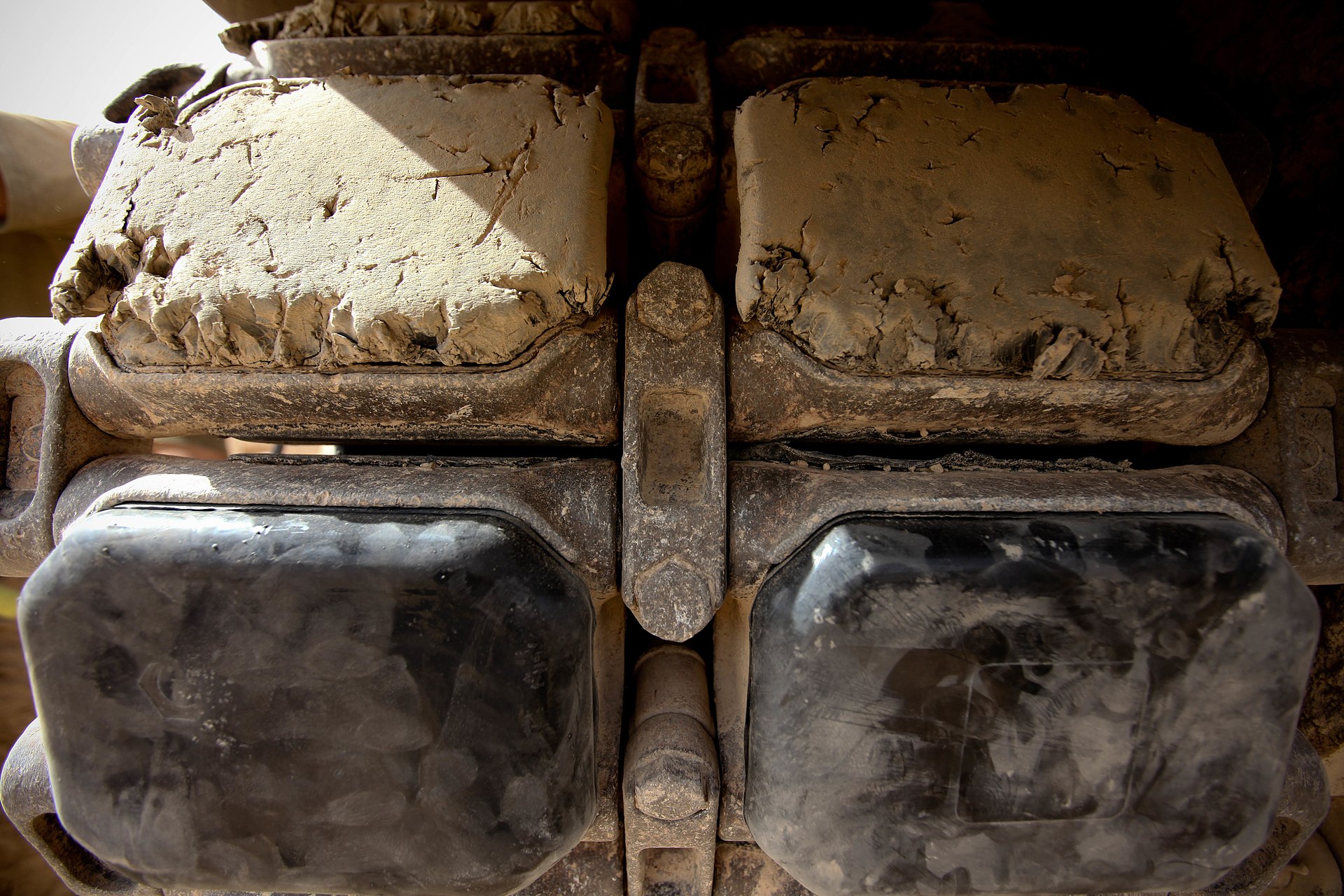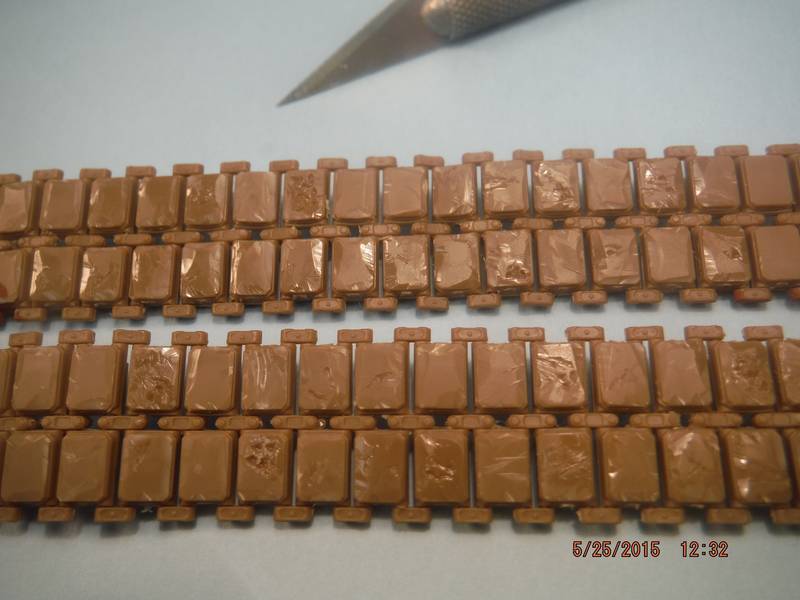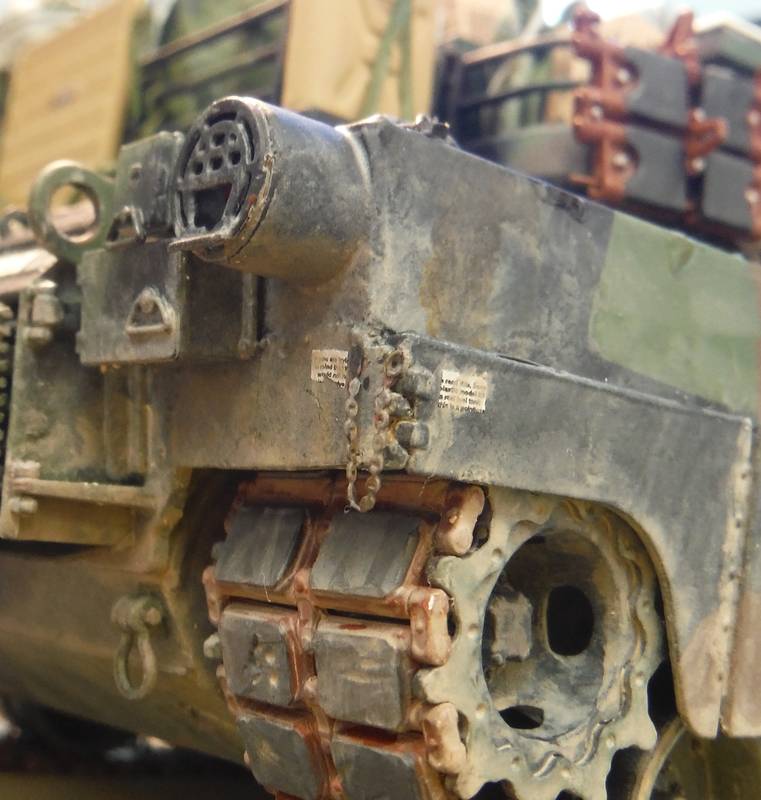Armor/AFV
For discussions on tanks, artillery, jeeps, etc.
For discussions on tanks, artillery, jeeps, etc.
Hosted by Darren Baker, Mario Matijasic
How to chunk rubber blocks on track?

TopSmith

Joined: August 09, 2002
KitMaker: 1,742 posts
Armorama: 1,658 posts

Posted: Saturday, January 05, 2019 - 06:35 AM UTC
I haven't tried this yet and I will be attempting soon. Some people do a realistic job and others not so good. What technique works best for you? Do you have any photos to help with the explanation?
Posted: Saturday, January 05, 2019 - 07:48 AM UTC
Hi Greg,
I am using a small diamond bur in a dremel to do the tracks on my Abrams. There are some pics on page 7 of the MBT Campaign.
Cheers Rob.
I am using a small diamond bur in a dremel to do the tracks on my Abrams. There are some pics on page 7 of the MBT Campaign.

Cheers Rob.
Kevlar06


Joined: March 15, 2009
KitMaker: 3,670 posts
Armorama: 2,052 posts

Posted: Saturday, January 05, 2019 - 09:07 AM UTC
Greg, I haven't done this technique in a while, but I have used a dental burr in my Dremel. About ten years ago I bought a set of collets from Micro Mark that had sizes from .01mm up to about 2mm. I also convinced my dentist to save her used burrs for me (no longer good for teeth, but they work well on plastic). To my surprise, she handed me a bag of about 500 sterilized burrs! I've given away all but about 100 over time. The burrs come in various lengths and sizes, most are cylindrical or tapered, but they a perfect for replicating "gouges" in tracks. The only thing is, you have to gouge almost every visible track pad or the effect is lost-- and that's a lot of work for most rubber pad type tracks. There are some aftermarket companies that make resin or plastic worn track-- you might want to do a little research for them. . Let me know if you want a selection of burrs-- I'd be glad to send you some-- but you'll need to come up with a collet for them as they are much smaller than the standard Dremel collets.
VR, Russ
VR, Russ

Frenchy

Joined: December 02, 2002
KitMaker: 12,719 posts
Armorama: 12,507 posts

Posted: Saturday, January 05, 2019 - 09:16 AM UTC
Masterclub has released several track sets with worn pads.
Here's a nice close-up of a 1:1 Abrams :

H.P.
Here's a nice close-up of a 1:1 Abrams :

H.P.
Posted: Saturday, January 05, 2019 - 01:10 PM UTC
Don Haney talks about "technique described by Robert Burik" in his excellent build of All Bout Da Bones -Thunder Run. Link to Don Haney's work here: https://armorama.kitmaker.net/forums/210167
My attempt at using hot tip and X-acto knife here:

Have fun. Best of luck!
My attempt at using hot tip and X-acto knife here:

Have fun. Best of luck!
panzerbob01

Joined: March 06, 2010
KitMaker: 3,128 posts
Armorama: 2,959 posts

Posted: Saturday, January 05, 2019 - 02:42 PM UTC
Good question, seeing as many of the more-modern tracked AFV end up showing wear and tear on the rubber pads...
My approach is to gouge each pad individually with a hobby-knife, small chisel, dental pic or other sharp and pointy instrument - just as I do the rubber tires on road wheels and rollers. It's a little tedious, but not actually very so! Each pad is a tiny sculpture. It never seems much worth-while to get out power tools and such for gouging what amounts to a couple dozen pads per vehicle / build, to me.
You are actually saved a lot of work in most vehicles because you don't need to do the down-facing parts hidden under the track in the "dirt" (unless you really want to, and / or you want to depict some wear on the outer edges of the "down" pads...), and many vehicles have skirts and such that hide most of the upper runs, too. So most effort goes into those pads on the visible aspects of idler and sprocket.
And, in many cases, the reality is that some pads are replaced - a track run may be a mix of worn and new pads, so there is both work-saving and opportunity to add unique variation by doing only some of the visible pads.
My "guide" to what to sculpt is always to look at pics, such as those posted in this thread, to see what I want to emulate.
Just my thoughts on the subject!
Cheers! Bob
My approach is to gouge each pad individually with a hobby-knife, small chisel, dental pic or other sharp and pointy instrument - just as I do the rubber tires on road wheels and rollers. It's a little tedious, but not actually very so! Each pad is a tiny sculpture. It never seems much worth-while to get out power tools and such for gouging what amounts to a couple dozen pads per vehicle / build, to me.
You are actually saved a lot of work in most vehicles because you don't need to do the down-facing parts hidden under the track in the "dirt" (unless you really want to, and / or you want to depict some wear on the outer edges of the "down" pads...), and many vehicles have skirts and such that hide most of the upper runs, too. So most effort goes into those pads on the visible aspects of idler and sprocket.
And, in many cases, the reality is that some pads are replaced - a track run may be a mix of worn and new pads, so there is both work-saving and opportunity to add unique variation by doing only some of the visible pads.
My "guide" to what to sculpt is always to look at pics, such as those posted in this thread, to see what I want to emulate.
Just my thoughts on the subject!
Cheers! Bob

Ringleheim

Joined: September 04, 2009
KitMaker: 184 posts
Armorama: 183 posts

Posted: Saturday, January 05, 2019 - 09:10 PM UTC
Whatever technique you implement, keep it in scale!
This sort of thing is very easy to overdo and consider that a 1" missing chunk of rubber in real life is .7MM in 1/35 scale.
This sort of thing is very easy to overdo and consider that a 1" missing chunk of rubber in real life is .7MM in 1/35 scale.
 |












